Psychoanalyzing Microaggression Mania
Radical narcissism.
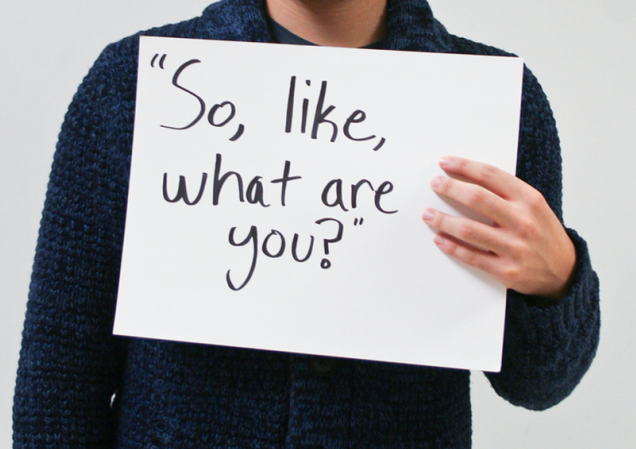
Political correctness gets crazier and crazier, but it does so in a way that seems to represent the development of something that was there right at the beginning.
I’ve been trying to make sense of it, from a psychoanalytic point of view, and the theory has, gratifyingly, developed apace with what it is trying to explain.
The current edge of the theory is what I call the “pristine self,” which is a self touched by nothing but love, and I am pleased to suggest that it gives us some insight into the current edge of political correctness, which is built around the concept of “microaggression.’ In this post, I’d like to lay out that connection.
Microaggression is a key element of what has been called the “new pc,” whose newness Megan McArdle renders this way:
When I was in college, people who wanted to censor others were forthrightly moralistic, trying to silence “bad” speech. Today’s students don’t couch their demands in the language of morality, but in the jargon of safety. They don’t want you to stop teaching books on difficult themes because those books are wrong, but because they’re dangerous, and should not be approached without a trigger warning. They don’t want to silence speakers because their ideas are evil, but because they represent a clear and present danger to the university community. If the school goes ahead and has the talk anyway, they build safe spaces so that people can cower from the scary speech together.
Academia’s Invention of the Microaggression
Microaggression appears to be what these people are afraid of.
Columbia University Prof. Derald Wing Sue, godfather of the concept, defined it as “the brief and everyday slights, insults, indignities and denigrating messages sent to people of color by well-intentioned White people who are unaware of the hidden messages being communicated.”
Generally, the racial category has been expanded to include other designations of “marginalization.”
But there is an obvious problem here. Sue claims “microaggressions” are unintentional. But aggression begins internally. A microaggression must refer to something going on in the person who sends the communication, not just the one who receives it. The claim of being microaggressed against must rest on certain beliefs about the mind of the microaggressor. But what can they be, especially given the stipulation that microaggressions are not generally meant to hurt?
The premise here must be that the victim of the microaggression has unerring insight into the unconscious mind of the microaggressor, and can find aggression of which the microaggressor is unaware.
But on what can such a claim of insight be based? I personally know a number of people who do psychoanalysis for a living, and none think that the unconscious mind is openly visible.
One necessary feature of the claim of unerring insight is that you have to get it right. There’s no room for error here. You either know what’s going on in somebody else’s unconscious mind or you don’t. The problem is that such claims are often wild and even absurd. They thus call into question the claim of insight.
Sue, himself, provides numerous examples of such dubious claims. For example, he tells us:
A third generation Asian American is complimented by a taxi cab driver for speaking such good English. (Hidden Message: Asian Americans are perceived as perpetual aliens in their own country and not “real Americans.”) (Sue and Rivera, 2010)
The point here is that, in order to count as a microaggression, there must be an aggressive component.
This must be that the taxi cab driver is rejecting the Americanness of his passenger. But the premise here is that he must feel authorized to speak for America and rule on who is a “real American.” Equally interesting, the passenger, whom I take to be Sue, must be giving credence to that authority.
We have before us two possibilities. First is that Sue has accurately perceived the rejection in the cab driver’s mind. The second is that, while he feels the rejection as coming from the cab driver, it is actually self-rejection, perhaps related to his own alienation from American society, which he expresses with every word he writes, and which he has projected into the driver’s mind.
Of the two, I think the latter is much more likely. This is a profession that, at least in my own experience, is largely populated by immigrants. None of them descend from the Mayflower. There is scant likelihood that any of them would feel authorized to make that judgment. This suggests that Sue finds the rejection there because he has placed it there, along with the authority.
The broader implication we can draw from this case is that in understanding the charge of microaggression, we cannot stop with an exploration of the mind of the supposed microaggressor; we also must consider what is going on in the mind of the person who feels microaggressed against. For a full comprehension we must understand how they have construed their experience to the point of classifying it as microaggression.
Microaggression in Common Use
Whether what we have seen with Sue would be a typical pattern is not for us to say at this point; we must note that Sue has a specific career interest in his accusations. For the purpose of a more general understanding of what is going on in the mind of individuals who find themselves so victimized, we need to have a broader base.
For that purpose I turned to the Internet, where people regularly post stories of their experiences of microaggression, especially at a Tumblr blog named Microaggressions: Power, Privilege, and Everyday Life, but also at a page at Buzzfeed, which has the advantage of showing how the victims of microaggression wish to present themselves.
As I said, my frame for understanding these expressions is a concept that I call the “pristine self,” an idea I develop in my forthcoming book Political Correctness and the Destruction of Social Order: Chronicling the Rise of the Pristine Self (in press: Palgrave Macmillan). The “pristine self” is an idea of the self touched by nothing but love.
My claim is that when students demand “safe spaces,” trigger warnings, and protection from microaggressions, they work upon the assumption that they deserve to be treated by others in terms of their “pristine self;” that the only acceptable way that others may relate to them, whether through speech or gesture or even thought, is with love. Everything else is intolerable.
I want to illustrate this through some reported microaggressions. Consider this one:
Was biking through town when two women yelled “Konichiwa!” at me…
I’m Vietnamese. And I was born in California.
(Also, where’s the female solidarity?)
The term konichiwa is Japanese for “Good afternoon”—hardly a phrase of aggression. The microaggression, evidently, was that two women addressed another woman (a stranger to them) in Japanese, presuming that she understood Japanese, even though she was Vietnamese and born in the U.S.
That this was experienced as an aggression can only mean that the two accidental microaggressors were supposed to know that the woman was Vietnamese, and possibly even that she was born in America. And they were supposed to know this without asking, since, according to Sue, asking where a person is from is itself a paradigmatic microaggression, suggesting that the person being asked does not belong here (see Sue, 2001: p. 36). For example:
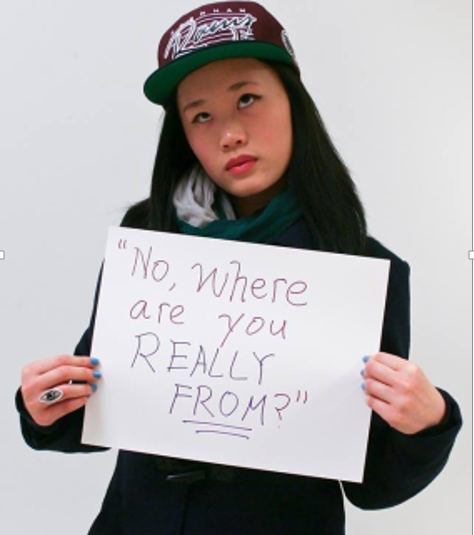
[Credit: Kiyun Kim]
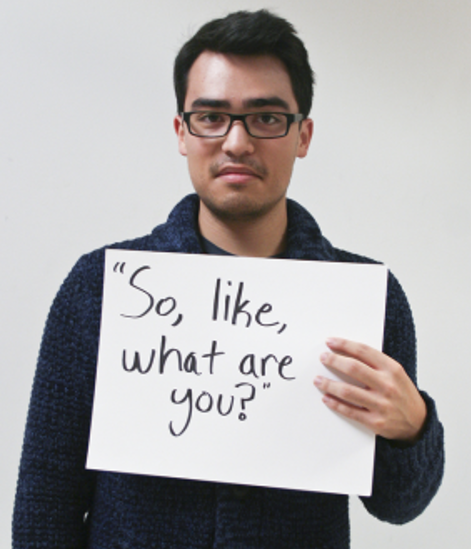
[Credit: Kiyun Kim]
Stranger: What do you do?
Me: I’m a professor.
Stranger: You’re way too young to be a professor. You look like a student.I’m in my 30s and I dress more professionally than my colleagues. But I’m also petite and female. My male partner, who has the same age and occupation, is never told that he doesn’t look like a professor. It sends me the message that I’m an imposter, merely play-acting at being a serious scholar or authority figure. Made me feel like no one will take me seriously despite my accomplishments.
Others are supposed to know how one defines oneself, even when there are no outward signs. For example:
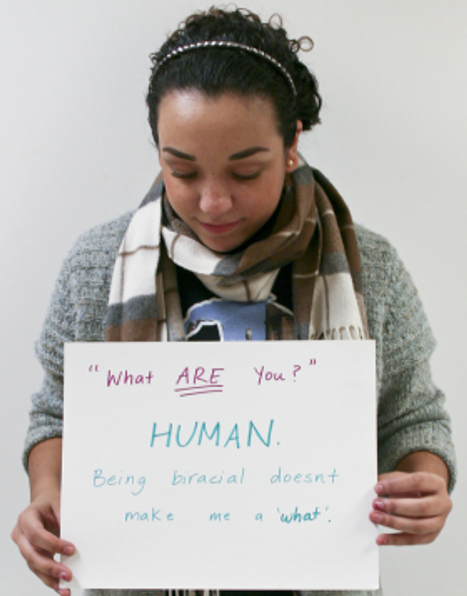
[Credit: Kiyun Kim]
“What are you?”
HUMAN
Being bi-racial doesn’t make me a what.
My black friends: You aren’t really black though, you act like a white girl.
My white friends: You aren’t really white though, you’re like dark.
All of them telling me I have to be one, I can’t be both. I’m just me though. Makes me feel like I can only be a certain race if I look and act a certain way.
And they are supposed to behave toward you in a way that conforms to your self-definition.
While practicing my martial art (Aikido) my partner, a large and muscular middle-aged man, begins to instruct me as if he is doing me a favor—despite the fact that we aren’t too many ranks apart and he has no teaching certification. I felt worthless, as if his status as older, stronger, and a man gave him the right to break dojo etiquette (only instructors should instruct) simply because of my small, girl status. His intentions were good, but his actions so incredibly misguided, unhelpful, and condescending. I felt as though I couldn’t say anything without sounding like an overly sensitive little girl…
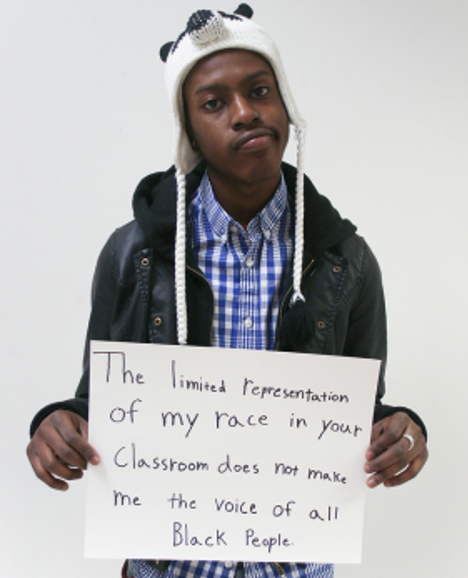
[Credit: Kiyun Kim]
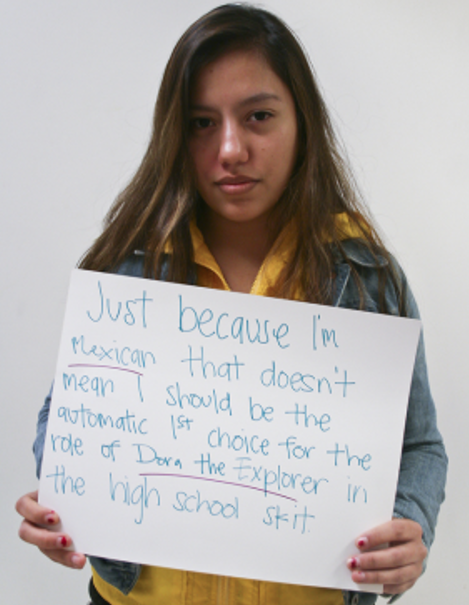
[Credit: Kiyun Kim]
So my girlfriend had to go to the ER and I went to join her. I introduced myself to ER staff (when asked) as her girlfriend. Every staff ended up referring to me as her friend. Then I had to let my professors know I wouldn’t make it to classes that day and they could cancel my interpreters because I was supporting my girlfriend through an emergency situation. Every single one of them replied “I hope your friend is okay.” Thanks for the well-wishes, maybe you could do it next time without de-legitimizing same-sex relationships.
This is so even when others do not have the same attitudes toward one’s chosen identity as one’s own.
Starbucks employee (male):: What can I get you Sir?
Me (transitioning female to male):: [order]
SE:: Oh I’m sorry Miss.
Me:: Uh…it’s sir.
SE:: Here’s your coffee MISS sorry again MISS.
My friend thinks I “confused” him. I’m also a college student so if I wasn’t sir, I should have at least have been ma’am.
This sensitivity is demanded even from people who are not aware that the potentially-microaggressed person is there and listening. Evidently, we are all supposed to have every potential microaggression in mind:
While whale watching on a touristy boat in Maine, we were having trouble getting close to a whale who kept diving farther away from us. I was standing at the very front of the boat and overheard this exchange between two strangers:
Man #1: The whale keeps diving away from us and getting farther out. (laughs) It probably thinks we want to mate with it.
Man #2: It’s definitely a female whale, then. It’s like, “Get away from me, please, get away from me!”
(They both laugh and Man #2 continues to say things such as, “Get away from me! Stop coming close!” in a high pitched, feminine voice)
I am a 20-year-old sexual assault survivor. I felt shocked, worthless, depressed.
What we see in all this is consistent with our critique of Sue. If a microaggression must first of all be an aggression, there is blessed little of it on display. Where there is aggression, as in the Starbuck’s case, there is no need to probe the unconscious in order to find it. The counterman is simply conveying to the customer that he disapproves of this transgender stuff. There is nothing further to be revealed.
Rather than aggression, almost every case simply involves people addressing others, or even speaking in a way that others find out about, in a way that does not comport with the way that they think of themselves. The speakers may, or may not, be clumsy about this, but clumsiness is far from aggression. And yet there is no reason to deny that the recipients feel attacked; they feel threatened. How did that happen? How did they make that construal? Here is where the theory of the pristine self may be of use.
Microaggression and the Pristine Self
My hypothesis is that the individuals who present these incidents as aggressions define themselves in ways that, beginning with their unique, ineffable selves, exemplify their claims to being worthy of love. The demands made though these self-definitions are never defended or even openly stated–but it is assumed they are understood and that their validity is self-evident. This is where we see the pristine self.
They see themselves as being microaggressed against when an interaction does not validate the ways they prefer to define themselves, and hence violates their feelings of being entitled to love.
This is the basis upon which people claim to feel endangered and unsafe when they encounter ideas that they disagree with. They are quite serious about this. The ideas that lead them to feel unsafe and endangered are ideas that threaten to undermine their pristine self. It is their pristine selves that they feel to be in danger, and they are right.
We began our inquiry with the presumption that the cause of one’s feeling of being microaggressed against was something that was in the mind of another. That turns out to be not quite right. The cause of microaggression is not so much something in the mind of another, but in the fact that the other has a mind at all.
One needs to see the radically narcissistic element in all this. We are all the center of our own lives, and we all seek to have ourselves loved and validated. That is what our minds are doing, much of the time, and is what makes our minds our own. What the microaggressed person is demanding is that they should be the center of our lives, and for us to seek validation for them.
The problem is that, in our time, all too often, the ideas that support our sense of being worthy of love are not antecedent ideas that we have lived up to, but rather ideas that support who we think we are, without regard to what we have done. The narcissistic premise of the pristine self comes first, and validates whatever ideas it appropriates to support itself.
After early childhood, there are no pristine selves, but in our time the expectation has developed that we should be treated that way; the pristine self has become normalized. That is why accusations of microaggression have arisen in our time, and not before. It is a dangerous trend: the normalization of the pristine self poses a serious threat to the basic structure of society.
I say this as a student of organizations. Organizations must be structured based on ideas that can apply to everyone, which is in direct contradiction to the normalization of the pristine self. Some of our most prescient writers have offered the observation that society is coming apart. This analysis suggests that they are correct.
Why the idea of the pristine self has become normal in our time, and how race and the various other marginalia fit into this, are matters I explore in Political Correctness and the Destruction of Social Order to be published this summer by Palgrave Macmillan. Watch for it.
References
Sue, Derald Wing (2010) Microaggression in Everyday Life: Race, Gender, and Sexual Orientation. New York: Wiley
————-
Howard S. Schwartz is a professor emeritus of organizational behavior at Oakland University. His previous works on the psychodynamics of political correctness includeRevolt of the Primitive: An Inquiry into the Roots of Political Correctness (2003, Transaction publishers) and Society Against Itself: Political Correctness and Organizational Self-Destruction (2010, Karnac). He lives now in Jackson Heights, NY.Legal Insurrection previously posted his work Psychoanalyzing The Great Oberlin College Racism Hoax of 2013.
[An earlier version of this article ran at the National Association of Scholars]
[Featured Image credit: Kiyun Kim]
Donations tax deductible
to the full extent allowed by law.








Comments
The Victorians thought that women are too delicate to handle certain realities. The rise of Microagressions has proven the Victorians right.
Good info / good reading. Thanks for posting.
Personal Opinion :
These kids ( self-raising / no learning self-control / helicopter parents ) leads to a 18+ year old still in diapers.
Do the parents ever realize they have failed at life and set their kids up for total failure as well?
“Today’s students don’t couch their demands in the language of morality, but in the jargon of safety.”
“Safety” appears to be resistance to growing up. Unless there is some clear identifiable threat like a North Korean re-education camp, this appears to be a serious psychological disorder. These people are dysfunctional. Get over it. When in grade school, my friends and I subjected each other to unrelenting verbal attacks. Guess what–we grew up to be adults and are still friends. We can stand up for ourselves and others with arguments and more. We can function in the military and business worlds where nice does not always exist. These people are unemployable or worse. They are little children emotionally. I hope I did not make any LI readers feel unsafe with my rant about these future Dems.
I remember the Drill Instructors I had at basic. They kids would go completely mindless/catatonic in shock ( at just the language alone! ).
there is a highly nuanced, well defined term for this sort of thing…
“utter bull5hit”
Actually, it sounds like clinical narcissism. The personality and behavour profile appear to be identical with a pathological narcissistic personality.
I think that’s close, but there’s a crucial difference. The pristine self, for these people, is not their experience of themselves, but a belief in how they ought to be treated. They do not admire thmselves, but demand that you admire them. Clinically, I would say they are more paranoid than anything else, since they are always looking for threats. Still, I think we need to look at this as a cultural phenomenon, not one of individual pathology. These people did not pop up, with fully formed personalities, out of noplace.
Just because someone is caucasian does not make them racist, except to many microaggressors with double standards.
I agree with you, I think. Allow me to use less ink. I have always dismissed this behavior in terms of two sage sentences, one new and one old:
You don’t have the right to not be offended.
and
Love your neighbor as yourself.
“Today’s students don’t couch their demands in the language of morality, but in the jargon of safety.”
Perhaps, but that requires one accept that those making such demands are actually are concerned about their safety. And perhaps some are, but perhaps others are just power-seeking opportunists?
Surely an alternate explanation is that at least some don’t feel particularly unsafe, but just make demands because they can, and use these methods because they work? Especially on campus, where “hostile environment” legal precedent can give such demands a great deal of authority.
redc1c4 is right: it is utter b.s. – but it’s also corruption that ‘victims’ buy into – and sell themselves rather cheaply.
The deal is this: the leftist sellers of this b.s. are in positions of power over the student ‘victims’ who buy into this and become the brownshirts of the left. (Gosh, who let that happen?) The payback for the students is to allow them to do nothing productive throughout their 20s: they will cruise mindlessly to what could be the most productive time of their lives. So instead of building a future, they’re remain infantile, told they’re wonderful for smoking a ton of dope, becoming Nancy Pelosi’s generation of failed artists, f–king anything that walks, and remain otherwise irresponsible children until well into their late 20s (no accident they’re allowed to remain on their parents’ medical insurance until they are 26.)
The joke is on the 20-somethings: they are in for decades of pain For selling their souls to leftist devils.
The “joke” may be on the 20-somethings, but the bill will be presented to the rest of us.
Sure, they’ll feel decades of pain and have no productive life, but their non-production (except for unconstrained reproduction) will be
subsidized by the governmentpaid for by we who are constructively productive.The “joke” is hilarious, in a tragic sort of way … but I’m not laughing.
There is a popular conception on the right that “kids these days” are somehow inferior creatures to the ones minted in our day. I think that’s a cop-out, excusing us from the need to address their deficiency because they are fundamentally “broken”. Brought up right, and in the right environment, they would be a strong a self-reliant as we had to be.
I have a theory that is probably not incompatible with your pristine self theory. Children, and to a lesser degree adults, will be as broken, helpless and pathetic as they can get away with while avoiding painful feedback, as a group. Some individuals will avoid this behavior. It is only painful feedback that prevents them from indulging their most decadent behavior. It is not surprising, therefore, that they rebel against standards, traditions and behavioral norms that seek to constrain their excesses of responsibility avoidance.
Each generation of mewling pups retains their snowflake status further and further into adulthood. Each generation of mewling pup parents become more indulgent than the last, having resented their own transition from child to adult. Only in an environment of artificial safety where nothing is allowed to be dangerous can such a thing happen. I can’t think of a place other than college or mom’s basement that can offer that sort of reality-resistant cocoon. It benefits neither the young person or the society that must incorporate them.
Next time somebody wishes me “Happy Holidays” I’m going to go off the reservation and get all whiny. I celebrate Christmas, like everybody should know that. I mean look at me, it’s pretty obvious I celebrate Christmas. How dare you don’t wish me a “Merry Christmas”!
Good plan. I may do that as well.
Me: Merry Christmas!
Them: I don’t celebrate Christmas. Don’t assume I do; I find that offensive. Please use “Happy Holidays” instead.
Me: I do celebrate Christmas. Don’t assume I don’t, because I find that offensive, along with your generic “Happy Holidays” greeting.
Them: What? How was I supposed to know that?
Me: Exactly. Just smile and accept the damn well-wishing.
The way I view this hullabaloo over “microagressions” and other PC nonsense:
These whiny brats are a cross between narcissism and immaturity. They think only of themselves, and their entire sense of worth/well-being is wrapped up in what others think of them. When they discover that others don’t dwell on the brats and their feelings, and say/do something that doesn’t comport with their own distortions of reality (more accurately, their fantasies), they fall all to pieces like Humpty Dumpty, and no one is able to put them back together again.
Wah, wah, wah – babies gotta be coddled and cosseted – wah, wah, wah ~
And assuming all these ridiculous claims are truthful, which is unlikely.
It seems to me that perceiving microaggressions is largely a matter of putting the worst possible interpretation on otherwise innocent remarks in order to play the role of “victim.”
In leftist ideology victimhood gives status, and gives the “victim” the appearance of occupying the high moral ground — without actually having to do anything remotely moral.
I sort of pity the author; searching for rationality in a bowl of mush has to be a frustrating life endeavor.
No need for pity. There is some frustration involved, but it is more than compensated by the fascination. I’m not searching for rationality, though. I’m trying to get to a rational explanation of irrationality. That’s where the psychoanalytic theory comes in.
At the most basic level, we need to find a way to understand how this absolute bullshit, which everyone with half a brain and the willingness to use it can see, increasingly dominates our culture.
We can express our contempt for these people all we like, but they are our future, and unless we can manage to comprehend and shape them, they will shape us.
Dr. Schwartz: I certainly concur with your summation reply, “… but they are our future, and unless we can manage to comprehend and shape them, they will shape us.”. Your article was good and appreciated.
It is not contempt for these people that I hold so much as it is sad to compare today’s youth with the carefree, adventurous youth of my day (and probably yours). A question I would ask you is, “Did our generation fail to impart strong values, or is this the result of a soft and spoiled society?” Probably a combination of both but your impressive reasoning would be worthwhile input.
The pity comment was poorly imparted tongue-in-cheek. I can understand your fascination with the subject, otherwise I would not have read the entire article – a shared concern and interest in what can be done to solve the problem.
aGrimm,
This is a matter of great complexity, I think, and has to do with a cultural shift in the relations between mother and father, and, by extension, men and women. Putting it briefly, mother’s role was built around a very tight emotional connection with the children. Within the context of her love, they experienced themselves as the centers of a loving world. In our time, father’s role was built around engaging the external world, which doesn’t give a damn, with the aim of protecting the sphere of maternal love. His hope was that he would be included within it. His role in socialization was to be a model of competence, so that the children, emulating him, could imagine gaining the love of someone like mother, through their own work, in their own time.
But this configurastion was based on the premise of mother’s love for the father. In the current time, that premise can no longer be maintained; she despises father and denies his competence and the value of his works. The love he received was not earned but stolen from the children, especially the “marginalized” ones, who now believe they are entitled to have it back. The route to her love is not through becoming like the father, but by getting him out of the way. Hence, the pristine self, as an entitlement, and all the other aspects of political correctness.
This is a drastic oversimplification, but maybe there’s enough there to tempt you into reading my books.
I ordered your SAI book. If I may offer one constructive criticism:
Your article and the reviews of your books indicate you can be pedantic. This is fine for academic books but poor for general reading audiences such as this blog. I learned this lesson the hard way when trying to educate the general public about radiation matters. I was pedantic and failing to get my message across. Once I distilled my subject matter, couched within high school knowledge, I became effective in getting my message across. Yours is an important message and I urge you to find ways to make it palatable for the general public. Imagine a book geared to the HS male; maybe it would help the pendulum to swing back to something that makes sense.
PS: talk to your publisher about getting your books into paperback or electronic (e.g. Kindle) format. It is the rare day I will buy a hard back book outside of my professional interests and there are plenty of others like me whom you could reach with via other formats.
Thanks, aGrimm. That’s good feedback. I do my best on the pedantry front, but a more popular style, as long as it doesn’t sacrifice the complexity, could be useful.
SAI is available in Kindle. The next one will have an availability problem, though. Palgrave Macmillan is an academic publisher who make their whole list available to subscribing universities as free “open access.” The book will be generally available, but expensive. Best thing to do is find a student. Just be careful not to microaggress.
Most of these incidents seem contrived, frivolous, or both. I assume the taxi incident happened in NYC, and if so the micro-aggressor was probably lower on the PC-victim scale than the micro-aggressed-against — check your privilege, Sue.
Part of this insanity comes from progressive fascism and the fact that it is a religion primarily of women and women’s values. The teachers can’t resist imposing their religious values on their students with the goal of creating good little progressive fascists, just as the Nazis and Communists seek to create supporters of the state ideology. The policy of opposition to “all forms of violence” which pervades our schools is the best example of this. The cure is to identify these ideas as religious in nature and ban this proselytization.
I agree with you on this, but who is going to do the banning? The old white men?
Spare the rod and spoil the child.
I find much of the SJW lunacy hilarious even as I agree with many of their claimed intentions, and while talk about microaggressions can occasionally be educational (in the sense of letting us in to understand the insecure minds of others) they are often absurd.
What I find especially hilarious is the presumption that white men can’t possibly understand what it is like to be in a weak position. Knowing many lower class white men who feel incredible pressures to provide for their families and perform in accordance with social expectations, and knowing upper class white men who are relieved of some of those pressures but subjected to responsibilities not only for their own families but those of their employees and even their communities, it seems absurd to presume that any privileges white men have mean much. As a pedophile (in the scientific sense – having an attraction to children – girls, in my case) I can’t think of many groups having a lower status in contemporary American society. In fact, I recall listening to the news on 11 September 2001, and hearing a commentator say that these terrorists who had just murdered what at the time were speculated to be as many as 50,000 innocent people, were ALMOST as bad as people like myself who have no interest in harming anyone. I have heard colleagues discuss what should be done with people like myself, and the debate generally settles to the question of whether we should be mutilated and then murdered, or murdered and then mutilated – with the more kind-hearted people favoring the latter. If anyone should be able to feel microaggressed, it should be me – but I am simply glad to know who my enemies are. It helps me decide who I should help out when possible, and who I should leave by the wayside.
Meanwhile, if I venture to offer an opinion that slightly differs from the politically correct orthodoxy of the day, I am derided as being out of touch and my opinion worthless because I am a white male and it is impossible for me to know what it’s like to be them. I just laugh to myself at their idiocy.